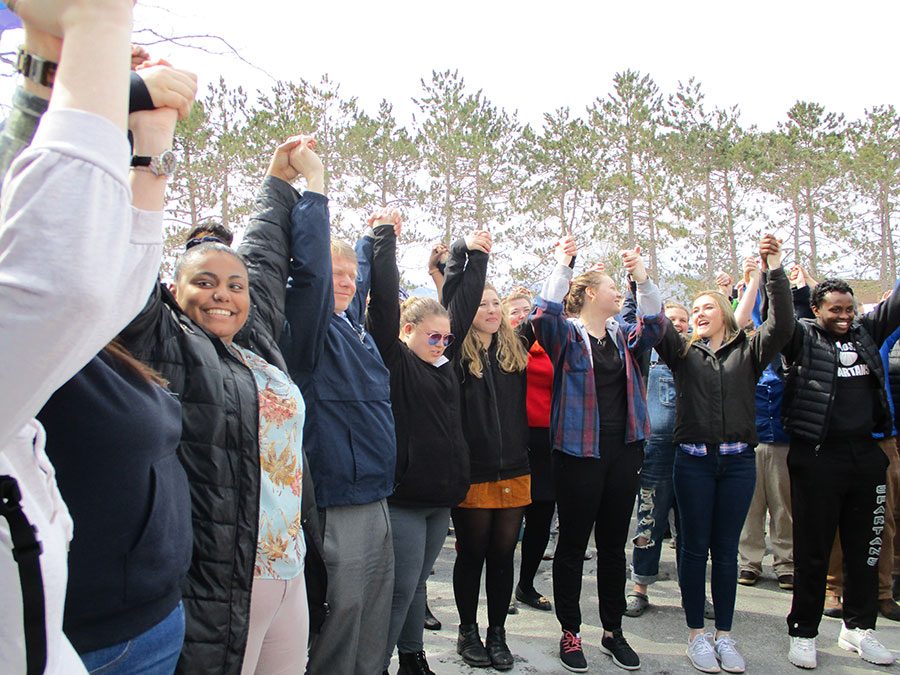NVU-J comes together against anonymous hate speech
The NVU-Johnson community has banded together in support of students who had been targeted by hate speech in two separate incidents in the residence halls.
Over a hundred students, staff and faculty members gathered under the flagpoles on the quad on Thursday, Mar 28 to celebrate diversity and inclusion on the Johnson campus. President Elaine Collins stood on the bench and addressed the crowd. “Today,” she said, “we stand together in condemnation of all acts of hate. Hate has no home at Johnson.”
In response, the crowd cheered and clapped.
“I ask each member of the community to contribute to defining who we want to be as Northern Vermont University-Johnson,” said President Collins. “We will not be afraid of tackling big challenges. We will remain a diverse and inclusive community in all its loveliness. I’m enormously proud of how our broader community has come together. Let’s apply this positive energy that we brought to this gathering to protect and enhance our community values in days ahead. We will not be deterred.”
After President Collins gave her address, both SGA President Jessica Malskis and Dean of Students Jonathan Davis gave similar speeches about the event.
“Our brothers and sisters here at Johnson come from all different backgrounds,” said Malskis. “That is what makes us as a campus so beautiful. There are so many statistics about the fear and discrimination these groups face every day. Our campus should never be a part of these numbers.”
After these planned speakers, students were invited to step up onto the bench and give their personal experiences. Several RAs and Residence Life staff, including Norma Aguilar, Fallon Repeta, ReAnna Jean Adams and Kelsey LaCasse spoke about their love for NVU and the support systems in place in the Res Life system.
“As rural as Johnson is,” said Aguilar, “I feel like family. I have met so many wonderful people. I have talked to so many wonderful students. I want to make sure that every student knows that if you need a safe place: I am a hall advisor. I’ve got two other HAs with me. If you need a safe place, please do not hesitate to ask for help. We are all a family and that’s what this is about.”
At one point, someone started chanting, “We Won’t Tolerate Hate!” and then within seconds, the whole group was yelling.
Fadhili Achinda, another RA, gave her message of positivity with a powerful statement. “When I moved to Vermont from Africa, I told my dad, ‘Vermont is very cold, but people who live in Vermont are very warm.’ Johnson is my home, and whatever or whoever goes against that, I don’t care. I will never let hate win in this place.”
As with other positive messages delivered, the crowd cheered.
“I love the people here,” Achinda continued. “To love somebody, you make a choice. To hate somebody, you make a choice too. You can say, ‘Hey man, I love you because, well, I love you!’ It’s all about the choice you make. Let’s love one another, and let’s let love win.”
LaCasse, who is also a member of the LGBTQ+ organization on campus known as NVUnity, spoke about the club’s dedication to making every student feel comfortable.
Other students spoke of their love of campus, and urged the student body and staff and faculty to take their positive energy and put it towards action.
Tyrone Shaw, the chair of the faculty assembly and professor of writing and literature, stood on a snowbank in the back of the crowd. “Any time you see a staff or faculty office, just know that right in there you’ll find a friend.”
Professor of Political Science David Plazek also spoke. “We’ve got to stand up to hate,” he said, “and I’m glad to see us here doing just that.”
While this outpouring of support was heartwarming, the cause of it was less so: in two separate incidents this semester, hate speech in the form of graffiti was found in two places.
In the first incident, someone scrawled a homophobic phrase on a bulletin board in a hallway in the residence portion of Martinetti. The slur didn’t stay for long. When Residence Life held floor meetings for the Martinetti residents, most admitted they hadn’t seen the graffiti but were glad that they were being supported by the administration. Since Martinetti has a large population of transgender and LGBTQ+ students, some students felt that the hate speech was placed in Martinetti on purpose.
The Residence Life office held floor meetings for all students in Martinetti.
“The Martinetti [incident] was challenging because it was written in a hallway that everyone walks by,” said Director of Residence Life Jeff Bickford. “Meeting with every single person in the building poses some logistical challenges, but we are on our way to having met with every single student that lives in the building.”
Outside of the floor meeting, however, the incident wasn’t really talked about around campus.
Then, on Tuesday, March 19, a racist phrase was found written on a bathroom stall in Senators South.
“When it happened,” said Cedric Bennett, “I was on the phone with my mom. I heard two people yelling, and then I was informed that someone had written [the phrase] on a bathroom stall.”
Bennett lives on the first floor of Senators South, where the slur was found.
“[Two other black men] saw it before anyone else did,” said Bennett. “They were banging on other resident’s doors, kind of in an uproar like, ‘Whoever did this, we’re gonna try and find the culprit.’”
Choosing to not join in on the yelling, Bennett said, “When they were in an uproar, I was more nonchalant about it. Not because I didn’t care, but because growing up my parents taught me how to deal with stuff like that. Whoever did that, they were obviously looking for a reaction. I’m not gonna give them that.”
Bennett emphasized that this act of hate doesn’t make him feel unsafe on campus, noting, “I personally don’t think it was anyone on our floor. Everyone does their own thing, minds their own business.”
In response to these hate crimes, Policy 311 cases have been opened. While the perpetrators have yet to be found, Bickford has, in both cases, held mandatory floor meetings and talked to students.
“Our general response falls along two different tracks,” he said. “One is the educational: we’ll have community meetings and educate why this is not acceptable in our community. We also give an opportunity for people to talk about how they’ve been impacted if they choose, known as an impact circle. That’s a type of restorative process. If the person who was responsible for the behavior is in the room, they’re hearing how that affected others. We hope that’ll open them up to a heart change and a behavior change. If they’re not in the room, we can hope it gets back to them.”
And even if students didn’t make it to the original floor meeting, they will meet at some point with Residence Life. “We’ll very soon have met with everyone on the floor that was affected in Senator’s,” said Bickford.
Throughout the rest of the semester, many departments are planning activities to have more conversations of acceptance and understanding among the community. Malskis and the SGA have restarted the positive affirmation sticky note campaign, and students are encouraged to stop by the SGA and write a few to place around campus.
The final speaker of the afternoon before Malskis asked students to sign the SGA banner was LaCasse, who said, “Don’t spread hate. Spread love and spread respect.”

Senior, Journalism & Creative Writing
Grew up in Atkinson, NH
Fall 2018
Along with traditional journalism, I enjoy writing satire and fun feature...



